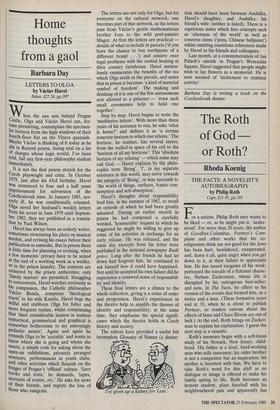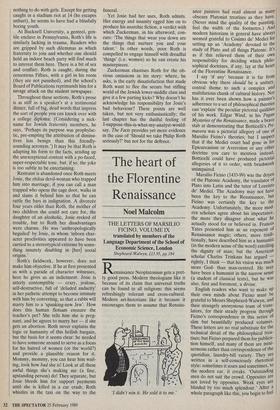The Roth of God or Roth?
Rhoda Koenig
THE FACTS: A NOVELIST'S AUTOBIOGRAPHY by Philip Roth
Cape, f11.95, pp.195
For a satirist, Philip Roth sure wants to be liked — or, as he might put it, 'under- stood'. For more than 20 years, the author of Goodbye, Columbus, Portnoy's Com- plaint and other works that his co- religionists think are not good for the Jews has been hurt, bewildered, exasperated, and, damn it all, quite angry when you get down to it, at their failure to appreciate him. He has issued exegeses of his work; portrayed the travails of a fictional charac- ter, Nathan Zuckerman, whose life is disrupted by his outrageous best-seller; and now, in The Facts, he offers us his version of the events that formed him, as a writer and a man. (These formative years end at 35, when he is about to publish Portnoy, so readers curious about the effects of fame and Claire Bloom are out of luck.) At the end, Roth brings on Zucker- man to explain his explanation. I guess the next step is a cassette. Roth's memoirs begin with a soft-focus study of his Newark, New Jersey, child- hood. His father is a kind, hard-working man who sells insurance; his older brother is not a competitor but an inspiration; his mother is besotted with him. We have to take Roth's word for this idyll as no dialogue or image is offered to make his family spring to life. Roth becomes an honour student, plays baseball with his neighbourhood pals and apparently has nothing to do with girls. Except for getting caught in a stadium not at 14 (he escapes unhurt), he seems to have had a blissfully boring youth.
At Bucknell University, a genteel, gen- tile enclave in Pennsylvania, Roth's life is similarly lacking in trauma. Readers who are gripped by such dilemmas as which fraternity to join and whether one should hold an indoor beach party will find much to interest them here. There is a bit of sex and conflict: Roth is caught, during the censorious Fifties, with a girl in his room (they are not punished), and the school's Board of Publications reprimands him for a savage attack on the student newspaper.
Throughout these sections, Roth's prose is as stiff as a speaker's at a testimonial dinner, full of big, dead words that impress the sort of people you can knock over with a college diploma. (Considering a nick- name for Jewish fraternity members, he says, 'Perhaps its purpose was prophylac- tic, pre-empting the attribution of diminu- tives less benign than this friendly- sounding acronym.') It may be that Roth is adapting his form to the facts, sending up the unexceptional content with a po-faced, super-respectable tone, but, if so, the joke is too subtle to be entertaining.
Restraint is abandoned once Roth meets Josie, the shiksa devil-woman who trapped him into marriage, if you can call a man trapped who opens the cage door, walks in and slams it behind him so that he can rattle the bars in indignation. A divorcée four years older than Roth, the mother of two children she could not care for, the daughter of an alcoholic, Josie reeked of trouble, but to Roth her disadvantages were charms. He was 'anthropologically beguiled' by Josie, in whom 'inborn char- acter proclivities appeared to have been carried to a stereotypical extreme by some- thing innately disabling in [her] social origins.'
Roth's fieldwork, however, does not make him objective. If he at first presented us with a parade of character witnesses, here he gives us an indictment. Josie is utterly contemptible — crazy, jealous, self-destructive, full of 'deluded audacity' in her pathetic attempt to become intimate with him by converting, so that a rabbi will marry him to a 'spanking-new Jew'. How does this human flotsam ensnare the teacher's pet? She tells him she is preg- nant, and he agrees to marry her — if she gets an abortion. Roth never explains the logic or humanity of this hellish bargain, but the basis for it seems clear: he needed to have someone around to serve as a focus for his hatred of women (or the world?) and provide a plausible reason for it. Mommy, mommy, you can hear him wail- ing, look how bad she is! Look at all these awful things she's making me (a fine, upstanding person) do! They separate, but Josie bleeds him for support payments until she is killed in a car crash; Roth whistles in the taxi on the way to the funeral.
Yet Josie had her uses, Roth admits. Her energy and insanity egged him on to produce his anarchic fiction, a verdict with which Zuckerman, in his afterword, con- curs: 'The things that wear you down are the things that nurture you and your talent.' In other words, poor Roth is compelled to engage himself with dreadful 'things' (i.e. women) so he can create his masterpieces.
Zuckerman chastises Roth for the ob- vious omissions in his story: where, he asks, is the early dissatisfaction that made Roth want to flee the secure but stifling world of the Jewish lower-middle class and give it a few parting kicks? Why doesn't he acknowledge his responsibility for Josie's bad behaviour? These points are well taken, but not very enthusiastically; the last chapter has the dutiful feeling of I-suppose-this-is-what-my-analyst-would- say. The Facts provides yet more evidence in the case of 'Should we take Philip Roth seriously?' but not for the defence.

















































 Previous page
Previous page